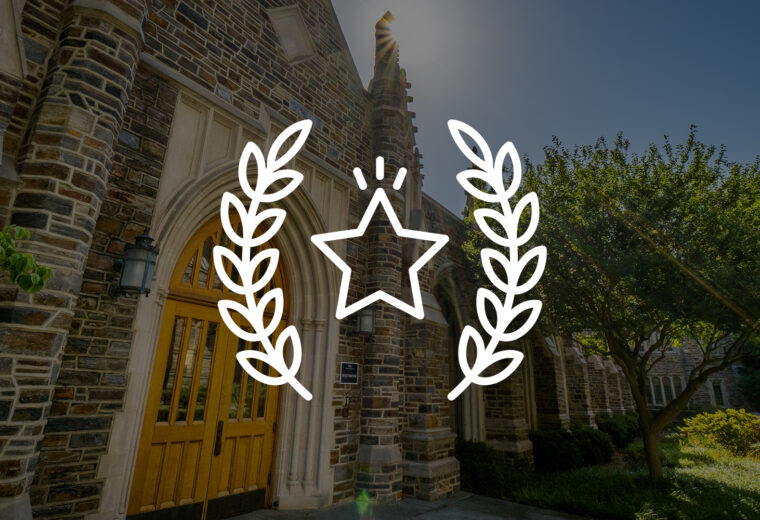
Reiter Recognized for his Work on Computer Security and Privacy
Michael Reiter won the 2024 Lasting Research Award from the ACM CODASPY
Our faculty members are recognized nationally and internationally for their professional excellence

Michael Reiter won the 2024 Lasting Research Award from the ACM CODASPY

Duke Engineering faculty and students garnered a wide array of awards and recognitions to start off the year

Duke Engineering faculty and students garnered a wide array of awards and recognitions over the summer

Duke Archives
Recognizing the most outstanding undergraduate research project
Awarded each year by the faculty in Duke Electrical & Computer Engineering as part of the Graduation with Departmental Distinction program.
The award is named in honor of Marie Foote Reel, Class of 1946, one of the first women to graduate from Duke’s College of Engineering with a degree in electrical engineering.
Recent winners of the Charles Ernest Seager Memorial Award, which recognized outstanding undergraduate research in the department from 1958-2020:
Presented to the senior who has shown the most academic improvement
The Fuller Prize for Achievement in ECE was established by J. Peyton Fuller IV, Class of 1954, in recognition of his son, David Randall Fuller, Class of 1987. It was first awarded in 1992.

Duke Archives
Recognizing outstanding undergraduate scholarship
Awarded by the ECE faculty to the student who has attained the highest level of scholastic achievement in all subjects and simultaneously rendered significant service to the Pratt School of Engineering and Duke.
The award was established in 1958 by the parents of George Sherrerd III, Class of 1955.

Duke Archives
Recognizing the most outstanding undergraduate teaching assistant
Created in 1997 by former students and colleagues of Charles Rowe Vail—1937 Duke graduate, professor (1939-1967), and chair of Electrical & Computer Engineering (1956-1964).
Recognizing outstanding teaching assistantship
Awarded to teaching assistants who have made significant, sustained contributions to the undergraduate curriculum through excellence as laboratory assistant or grader.
Nominations are based on student evaluations. Finalists are selected by the ECE faculty.
Advisor Cynthia D. Rudin: Jiachang is incredible. He is a theorem-proving optimization machine who has designed some of the most powerful ML algorithms for sparse models currently. Jiachang’s work is unsurpassed in quality both in its way of addressing difficult mathematical questions and in its practical impact. His recent work on the FastSparse and OKRidge algorithms solves one of the most important previously open questions in interpretable / sparse machine learning, which is how to construct sparse additive models, and how to choose interaction terms to include in the model. Jiachang’s NeurIPS paper on the FasterRisk algorithm will be a game-changer for AI in health care because it allows practitioners to build scoring systems in minutes, which previously might have taken months. I cannot say enough great things about Jiachang. He is already a leader in sparse models and interpretable ML. He’s really a force of nature. He deserves this dissertation award.
Advisor Aaron Franklin: Brittany was a truly exceptional PhD student. By the numbers, she certainly stands out with 5 first-author publications and a total of 13 publications from her PhD work! As for the scientific impact of her work, Brittany has led the development of new inks and processes for printing electronics that are more environmentally sustainable. In the final project of her PhD, she led the use of a new printing technology called capillary flow printing, with which she was able to demonstrate the first fully printed transistor with submicron dimensions — a milestone that has long been sought after in the field of additively manufactured electronics. Given her remarkable success in research over a relatively short time to PhD, it’s no surprise that Brittany (who also was an NSF Graduate Research Fellow) is being actively recruited for faculty positions this year. In fact, she was chosen to participate in five separate (and highly competitive) future faculty workshops at universities across the country! Honoring her with this Outstanding Dissertation Award is a fitting recognition of stand-out success in a PhD with a career trajectory that promises to continue illuminating the strength of a Duke ECE PhD alum!
Citation: Qitong stands out as one of the most exceptional PhD students I’ve had the privilege of working with. His groundbreaking contributions to automated decision-making in healthcare demonstrate not only a profound grasp of machine learning theory but also an extraordinary talent for translating these concepts into impactful real-world solutions. Qitong is the 1st student I have seen throughout my academic career who has demonstrated algorithmic frameworks that transcend traditional domain boundaries while delivering tangible improvements in healthcare applications, e.g., improving the current deep brain stimulation therapy for treating Parkinson’s disease with practical outcomes justified in clinics with real Parkinson’s partients. Qitong’s work represents a rare combination of academic excellence, practical innovation, and collaborative leadership. His achievements not only advance our understanding of automated decision-making but also hold the potential to transform health care delivery for the better.
Citation: Jessica’s dissertation, entitled “Applied Millimeter Wave Radar Vibrometry,” is a groundbreaking work that pushes the boundaries of millimeter‐wave radar technology in its applications in wireless communications and non‐acoustic human speech analysis. One of the most compelling aspects of Jessica’s dissertation is the development of a completely new form of wireless communications called Vibrational Radar Backscatter Communications (VRBC). This approach allows mmW radars, such as those in most automotive advanced driver assistance systems, to receive messages encoded in the vibration of transponding surfaces. Her results and analyses position VRBC as a desirable solution in spaces like X2V, offering unique benefits over commonly considered higher rate solutions such as direct short‐range communications (DSRC) which face challenges related to spectrum allocation, interference, security, and infrastructure cost.
Citation: Ang’s dissertation, titled “Enable Intelligence on Billion Devices with Deep Learning,” stands out as a testament to his exceptional research abilities and commitment to the field of Electrical & Computer Engineering. His dissertation focuses on the development of large-scale networked and trustworthy edge intelligent systems, aimed at addressing practical challenges in a collaborative, scalable, secure, and ubiquitous manner. His research has directly contributed to numerous advancements in the fields of edge computing, federated learning, privacy, and security. For example, his design of revolutionary secure, computation and communication-efficient federated learning frameworks have served as the foundation for other independent research studies, and also became the state-of-the-art method in this field. In addition, Dr. Ang Li also introduced the groundbreaking privacy-respecting data crowdsourcing framework for deep learning, as well as privacy-preserving techniques for online machine learning services.
Citation: As his main research topic, Zhongxi worked on medical device technology, specifically technology to non-invasively activate neurons in the brain. Instead of incrementally following the trends in the field and pushing the boundaries, he designed quite radical techniques to bypass the problem of limited focality of electromagnetic fields in the low-frequency range where neurons are susceptible. He developed an understanding and the necessary technology to use the type-specific activation dynamics of neurons to shift the balance of activation between neuron populations in the focus. That step, however, required the development of fundamentally different high-power electronic circuit concepts since conventional power electronics considered the problem of generating an arbitrary high-bandwidth output at high power as not solvable with existing circuits and semiconductors. This concept has now already been taken up by various other groups and several companies evaluate its commercialization.
Furthermore, Zhongxi developed a strong affection for energy and power topics, which he initially only pursued as his unrelated personal interest. He designed a novel concept to turn conventional hard-wired batteries into dynamically reconfigurable systems using only relatively low-cost low-voltage electronics to reach high power levels. Such reconfigurable batteries can for the first time solve the major problem of the large manufacturing tolerances of battery cells. In conventional batteries, the weakest cell determines the overall battery performance with respect to power, capacity, aging, and terminal damage. Zhongxi’s reconfigurable battery circuits can rapidly change the series and parallel configuration of its subunits to control charge, power, aging potential, and heat, while even bypassing broken elements at little extra cost. As this limitation is gone in reconfigurable batteries, which can further dynamically adjust their output voltage and even generate AC, Zhongxi’s concepts have started a new research field. Leading companies from the automotive and large silicon-valley technology companies are currently taking up this idea.
In addition to the first two contributions, which have already left a likely long-lasting impression on research and our actual world as products using such technology emerge, several courses here at Duke inspired his interest for unbiased statistics and estimation theory. Instead of only studying existing methods and applying them as an amateur, he again was eager to bring his work to a professional level so that he could himself successfully make a contribution to the field. He designed an estimator for neural responses to brain stimulation, which has substantially higher sensitivity than any method known in the field, is unbiased, and even achieves maximum-likelihood properties. With that method, Zhongxi could further demonstrate that excitatory responses to brain stimulation happen already at very low stimulation amplitudes and that what was previously considered the stimulation threshold in noninvasive brain stimulation and used as dosage parameter for all related diagnostic and treatment applications, is rather in the middle of the dose response curve.
Citation: In his PhD study, Linghao’s research focus is computer architecture and acceleration for deep learning and graph processing. He contributed to 29 publications on top venues including 1 ISCA, 4 HPCA, 5 DAC, 2 ICCAD, 5 DATE, 4 ASP-DAC and others. His Google Scholar profile records 885 citations and one of his works PipeLayer has been cited more than 300 times and is the most cited one among all papers in HPCA’17. He is also very active in serving the research community, including serving on the committee of 9 IEEE/ACM conferences and serving as a reviewer for 15 IEEE/ACM/Elsevier journals. He also mentored several female and undergraduate students in research and their works got accepted to top venues such as DAC, DATE. Linghao demonstrates diversified success of a Duke ECE PhD student.
Citation: There are rare times when a PhD student manages to succeed in every possible area of dissertation-related work; such was the case for Joseph “Joey” Andrews. In his four years as a PhD student at Duke, Joey was able to invent a now-patented sensor technology that led to a funded startup company, publish multiple papers in high-profile journals, win the best paper award at a top conference in his field, be selected as an NIH fellow based on a research proposal that he wrote, mentor countless graduate and undergraduate students, and make numerous discoveries that continue to be transformative for ongoing research in the field. His multitude of accomplishments made Joey an attractive candidate for faculty positions and he began as an assistant professor at the University of Wisconsin-Madison, a top engineering school, directly out of his PhD. Truly, Joey embodies that level of diversified success that we strive for in Duke ECE.
By both objective and subjective metrics, Junfei brought a wide range of technical skills, from theory to experimental implementation, and technical fearlessness to his research. His research work as a PhD student resulted in a remarkable variety of notable publications in the field of acoustic metamaterials and wave propagation theory. That body of work has already had real impact and influence, and he received internal recognition through a John Chambers Scholar fellowship through Duke’s Fitzpatrick Institute for Photonics. His most significant contributions were in the area of new paradigms for acoustic metamaterial design and in the development of tools to analyze and design them. His Google Scholar citation record (h=13, n=730 citations) demonstrates overall research impact that would be enviable for an assistant professor being considered for tenure, much less a PhD student less than one year from his defense. Junfei was an excellent student in all aspects of his PhD work at Duke; and the breadth, quality, volume, and impact of the research contained in his dissertation was very high.
Recognizing extraordinary service to Duke Department of Electrical & Computer Engineering.
Citation: Natalie is a perfect example of a student going above and beyond to give back to the Duke and ECE communities during her time in the program. She has helped with countless recruitment events, organized student social events, and put in the place many of the organizational structures of the current graduate student leadership group, EASE (ECE Advocacy for Student Engagement). She has spearheaded many events and programs that promote diversity, equity, inclusion, and community, some of which include ECHO (ECE College-High School Opportunity) and the Graduate Student Application Workshop. These events show Natalie’s desire to provide support to prospective students in the community with a focus on underrepresented groups. During her involvement with EASE, they were selected to receive the 2022 Dean’s Award for Inclusive Excellence in Graduate Education. The ECE Advocacy for Student Engagement program was chosen from a highly competitive pool of nominees for its consistent and intentional creation of an environment that demonstrates and is dedicated to exemplary inclusiveness and diversity in graduate education and the broader community. We are going to miss her terribly, but she can be assured that our department is only better because of her collaboration and support of our graduate students.
Citation: During his PhD study, Huanrui served as a TA for 5 semesters, including ECE 550D Fundamentals of Computer Systems and Engineering (Fall 2018), ECE 681 Pattern Classification and Recognition (Spring 2019), and ECE 590 / ECE 661 Computer Engineering Machine Learning and Deep Neural Nets (Fall 2019, Fall 2020 & Fall 2021). ECE 661 was a new course, first offered in Fall 2019. Huanrui contributed his expertise to the course’s design and served as the lead TA over subsequent semesters. The help from Huanrui was essential in making ECE 661 well-received by graduate and undergraduate students; the upcoming offering in Fall 2022 has more than 100 students enrolled. Huanrui is also leading the effort to draft a textbook for the course, which could have a broader impact on ECE education in the future.
Huanrui received top ratings and outstanding evaluation feedback from the students every semester that he TA’d. Moreover, multiple students expressed their intention of nominating Huanrui for a Departmental TA award, stating him to be “the best TA I have met in Duke ECE,” “dedicated, helpful and knowledgeable, very well deserved to be nominated,” and saying “he went above and beyond in TAing.” Besides teaching, Huanrui has mentored the research of multiple graduate and undergraduate students in the group.
Huanrui served as a reviewer for IEEE TNNLS, IEEE TCAD, Elsevier Computers & Security, Elsevier Neurocomputing, and multiple top conferences, including ICLR, ICML, NeurIPS, CVPR, MLSys, and TinyML etc. He was selected to receive a NeurIPS 2021 Outstanding Reviewer Award given to the top 8% of reviewers.
Citation: Runren Zhang has shown outstanding service to the department. He served as a TA for 551 for four semesters and for 571 for one semester. He was always friendly and approachable with students and it was really valuable to the class to have a TA with such thorough expertise.
Notifications